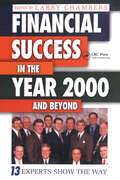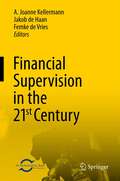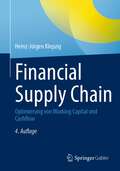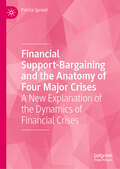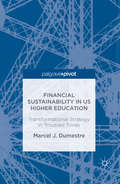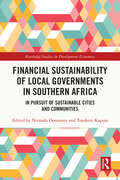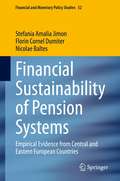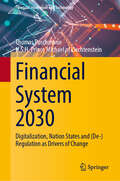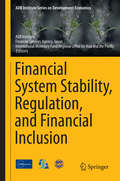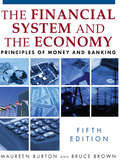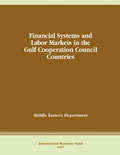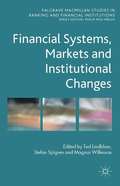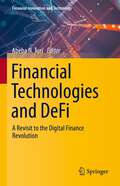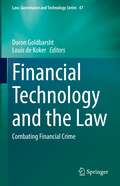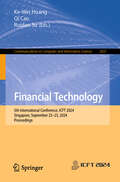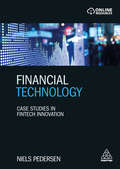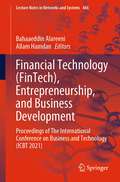- Table View
- List View
Financial Strategy for Higher Education: A Field Guide for Presidents, CFOs, and Boards of Trustees
by Michael K. TownsleyEconomic forces continue to reshape higher education, and the leaders of colleges and universities are not getting the guidance they need to achieve their financial goals. Michael K. Townsley, PhD, a seasoned higher education executive, shares proven principles, strategies, and techniques to manage the increasing pace of change in higher education in this field guide. Based on case studies, his own experiences, and insights from other experts, he provides strategic guidance on how to: effectively manage finances, allocate financial resources, design sophisticated budget forecasts, set tuition rates in competitive markets, control operational costs, and run online programs. With clearly ordered lists, logically sequenced plans for action, and cogently presented summaries, Financial Strategy for Higher Education offers a vital reference for anyone who managing the financial condition of colleges and universities during financial stress.
Financial Structures and Regulation: A Comparison of Crises in the UK, USA and Italy
by Alessandro RoselliA survey of past financial crises, starting with the great banking collapses of the interwar period. The current turmoil has prompted a number of questions regarding both its origins and ways to avoid its repetition. The historical background and the evolving institutional framework of banking and financial systems are at the center of this book.
Financial Success in the Year 2000 and Beyond: 13 Experts Show the Way
by Larry ChambersToday's investor faces a much larger challenge than those of just ten years ago. The size and complexities of the financial marketplace create confusion. The Dow Jones industrial average has doubled in the past two and a half years, and 10,000 on the Dow is no longer a fantasy. Money keeps flooding into the market. The New York Stock Exchange daily trading volume is four times that of 1990.Financial Success in the Year 2000 and Beyond covers financial planning and asset management, the fastest growing segments of the financial services industry. In the old days, highly commissioned salesmen would simply tell their clients what products to buy. Today, there are infinitely more choices and investments options to sort through and be concerned about. Technology has put complex investing tools into the hands of ordinary people, without good advice on how to use them. Never have so many people experienced so much control over their financial futures, yet felt a need for so much help. Applying lessons learned from past mistakes is hard and discouraging. Most people become investors without the wisdom of experience, getting the tests without first getting the lessons.Financial Success in the Year 2000 and Beyond explores virtually every aspect of financial planning and dispels many of the myths and mysteries surrounding investing and investments.The Experts include: Dennis R. Fletcher, CLU, ChFC, Oshkosh, WI , Joseph D. Longo, CLU, CFP, LUTCF, LIC, Troy, MI, Tom Nohr, CFP, RFC, Castro Valley, CA, Floyd L. Shilanski, Anchorage, AK, Robert Lyndon Taylor, LUTCF, Oklahoma City, OK, Michael P. Eischen, Columbus, OH, Lance A. Pelky, San Diego, CA, David W. Shepherd, RHU, ChFC , Tucson, AZ, Terry A. Vrieze, Des Moines, Iowa, Larry Rosenthal, RFC, LUTCF, Manassas, VA, William J. (Bill) Nelson, RFC, Cayton, OH, David S. White, Durham, NC, Mark Young, St Lewis, MO
Financial Supervision in the 21st Century
by Jakob De Haan A. Joanne Kellermann Femke De VriesThe financial crisis prompted financial supervisors to take a critical look at their own performance. The "toolkit" available to supervisors is considerably more varied than it was a few years ago. Supervision has become more forward-looking, taking into account also soft controls, such as 'conduct and culture', corporate governance, and business models of financial institutions. This collection of essays discusses several significant changes in supervision methods and supervisory organisations and examines what methods contribute to 'good supervision' and what can reasonably be expected of supervisors. The authors are experts in the field and most of them are affiliated to organisations responsible for financial supervision.
Financial Supervisory Independence and Accountability-Exploring the Determinants
by Marc Quintyn Donato Masciandaro Michael TaylorA report from the International Monetary Fund.
Financial Supply Chain: Optimierung von Working Capital und Cashflow
by Heinz-Jürgen KlepzigUnternehmensprozesse müssen ausreichend Cash generieren, sonst ist das Unternehmen betriebswirtschaftlich nicht in Balance und schnell in seiner Existenz gefährdet. Die Prozessgestaltung wird jedoch in vielen Unternehmen zu wenig monetär bewertet und betriebswirtschaftlich hinterfragt. Es gilt, diese Finanzströme – von der Kreditwürdigkeitsprüfung bis zum Zahlungseingang – zu optimieren und den Cash-to-Cash-Cycle zu beschleunigen. Im Rahmen des Working Capital-Managements ist das Freisetzen von im Working Capital gebundener Liquidität in den derzeitigen turbulenten VUCA-Zeiten zu einem der Top-Themen von Führungskräften geworden. Dieses Buch zeigt praxisorientiert vor dem Hintergrund aktueller Lieferkettenprobleme sowie Kaufzurückhaltung der Kunden, wie Unternehmen ihre Zukunftsfähigkeit durch aktives Working Capital-Management und Optimierung des Cashflows sichern können.Für die 4., erweiterte und überarbeitete Auflage wurden die Themen Supply Chain Financing, Lieferkettengestaltung und Liquiditätsbetrachtung im Rahmen von Cashflow-Rechnungen mit aufgenommen. Zwei neue Kapitel widmen sich den Themen Risikomanagement und Resilienz sowie Digitalisierung der Supply Chain.Der InhaltWirkung und Relevanz von Working CapitalVerbesserung der Financial Supply Chain durch ProzessmanagementKonzepte zu Working Capital-Analyse und -ManagementKPIs und Cashflow-RechnungHandlungsleitlinien im Risikofall
Financial Support-Bargaining and the Anatomy of Four Major Crises: A New Explanation of the Dynamics of Financial Crises
by Patrick SpreadThis book takes a detailed look at four major financial crises—the twin crises of the South Sea Bubble in Britain and the Mississippi Bubble in France in 1720; the Great Crash of 1929 and the subsequent Great Depression; and the Global Financial Crisis of 2007-9. It traces the evolution and causes of the crises by reference to a theory of support-bargaining and money-bargaining, set out in earlier work, but reintroduced here with specific reference to financial crises. Two early chapters focus on theoretical issues. The work of prominent theorists, including John Law and J. M. Keynes, is evaluated. A fundamental problem of neoclassical theory is its failure to accommodate time disparities, and consequent credit requirements, in economic transactions. This has necessitated theoretical separation of a &‘real economy&’ from financial markets. The separation renders neoclassical economists blind to financial services, and hence to the dynamics of financial crises. In support-bargaining and money-bargaining, the &‘real economy&’ and financial services are seamlessly linked. The book shows how the theory of support-bargaining and money-bargaining provides a clear and consistent explanation of the incidence of financial crises. Since financial crises are not exceptional events, the wider aim of the book is to convince social scientists that, in explaining financial crises, the theory of support-bargaining and money-bargaining provides also a superior explanation of the functioning of economies and societies in quieter times. It will appeal particularly to those many economists who find the prevalent neoclassical model of economic transactions inconsistent with the observable functioning of economies.
Financial Sustainability in Public Administration
by Manuel Pedro Rodríguez BolívarThis book analyses the methods used to assess financial sustainability as defined by the International Federation of Accountants (IFAC). Recently, there have been calls to consider sustainability as a fundamental guiding principle in public management. The financial and economic crisis has spurred a demand for greater financial sustainability in public administrations. Although the concept of sustainability has been traditionally associated with three dimensions (environmental, social and economic), this book is focuses on the metrics used to evaluate financial sustainability and explores the concept of financial health. It will be of interest to researchers and academics in the field of financial sustainability.
Financial Sustainability in US Higher Education
by Marcel J. DumestreThis book is a practical approach to insuring financial sustainability of US colleges, presented through the lens of organizational strategic thinking. The book does not simply offer models of how colleges can become financially sustainable in cost cutting, online education, international student recruiting, etc. Rather, it presents a succinct historical perspective of how foundational problems emerged, how some universities transformed themselves, and introduces an organizational strategic thinking process that can be used to develop unique solutions for almost any institution.
Financial Sustainability of Local Governments in Southern Africa: In Pursuit of Sustainable Cities and Communities (Routledge Studies in Development Economics)
by Nirmala Dorasamy Tonderai KapesaThis book delves into the critical issue of ensuring the long-term financial viability of local governments in the diverse region of Southern Africa. Across Southern Africa, cities and communities are facing a multitude of challenges, from rapid urbanization and infrastructure challenges to social inequality and environmental degradation. In this thought-provoking book, the authors explore the intricate relationship between financial sustainability and the pursuit of sustainable cities and communities through different lenses.Drawing on extensive research and case studies from various countries in the region, this book provides a comprehensive analysis of the financial realities faced by local governments. It examines the factors influencing revenue generation, expenditure management, and fiscal governance, shedding light on the complexities of financial decision-making in the context of limited resources and pressing development needs. Furthermore, it offers practical insights and actionable recommendations for policymakers, practitioners, and academics. It explores innovative approaches to revenue diversification, efficient expenditure allocation, and effective fiscal management, with the ultimate aim of fostering sustainable development, social services delivery, and environmentally sustainable infrastructure in Southern African cities and communities.This is an essential resource for anyone interested in understanding the challenges and opportunities associated with financial sustainability in the context of urbanisation and sustainable development in greater Africa. It serves as a guide and inspiration for building financially resilient local governments that can support the aspirations and well-being of their citizens while contributing to the broader vision of sustainable cities and communities.
Financial Sustainability of Pension Systems: Empirical Evidence from Central and Eastern European Countries (Financial and Monetary Policy Studies #52)
by Stefania Amalia Jimon Florin Cornel Dumiter Nicolae BaltesThe sustainability of public pension systems has become an important aspect for governments and institutions worldwide. This book addresses the multiple elements that influence the sustainability of pension systems with a special focus on central and eastern European countries. Supported by the results of econometric empirical studies, the authors discuss and analyse areas like social economy versus capitalist economy, globalization versus glocalization, population aging versus birth and fertility, emigration versus immigration, early retirement versus prolongation versus professional activity, the sustainability of public pension systems versus the adequacy of benefits provided, public pension systems compared to private pension funds and taxation of salary incomes versus subsidization of state social insurance.
Financial System 2030: Digitalization, Nation States and (De-)Regulation as Drivers of Change (Financial Innovation and Technology)
by Thomas Puschmann H.S.H. Prince of LiechtensteinThe financial system is currently confronted with tremendous challenges from the global economy, trade, politics, demographics, and most recently from enormous technological advancements. These developments have the capacity to change the existing financial system fundamentally. This book addresses how technological developments and digitalization will impact the future of financial systems. This book is based on the results of a series of ten roundtables with high-level experts on the future of the financial system. Experts from academia, supranational institutions, central banks, commercial banks, regulators, start-ups, technology companies, venture capital firms, think tanks, foundations, and other visionaries from five continents developed potential scenarios of the financial system 2030 over a time horizon of five years. The book presents the results of these discussions, which are structured along the ‘Vaduz Architecture’. This newly introduced concept distinguishes different dimensions for the future financial system, including information technologies, nation states and (de-) regulation.
Financial System Stability, Regulation, and Financial Inclusion
by International Monetary Fund Staff Springer Fachmedien Wiesbaden Staff ADB Institute Staff Financial Services Agency EditorsFinancial authorities face a number of key challenges, including maintaining financial stability; ensuring long-term finance for stable economic growth; promoting greater access to financial services for both households and small and medium-sized enterprises (SMEs); and fostering a competitive financial industry. Access to finance for SMEs is particularly important, given their large shares in economic activity and employment in Asian economies. Striking the appropriate balance in achieving these objectives through financial supervision and regulation is an important policy issue for financial regulators. This book is the record of a joint conference in 2014 organized by the Asian Development Bank Institute; Financial Services Agency, Japan; and International Monetary Fund Regional Office for Asia and the Pacific on the topic of financial system stability, regulation, and financial inclusion. Participants included noted scholars, policymakers, and financial industrial participants from Asia. ADB Institute The ADB Institute, located in Tokyo, is the think tank of the Asian Development Bank. Its mission is to identify effective development strategies and improve development management in ADB's developing member countries. Financial Services Agency, Japan The Financial Services Agency, Japan is responsible for ensuring the stability of Japan's financial system, the protection of depositors, insurance policyholders and securities investors, and smooth finance through such measures as planning and policymaking. International Monetary Fund Regional Office for Asia and the Pacific The International Monetary Fund Regional Office for Asia and the Pacific contributes to economic surveillance and research, leads the IMF's involvement in regional cooperation, manages regional capacity building programs, and promotes the understanding and two-way dialogue of the IMF in the region.
Financial System of the Economy: Principles of Money and Banking
by Bruce Brown Maureen BurtonAttempts to assess whether the United States is in economic decline. Appropriate to general readers as well as economics students and scholars, this book examines the fears of Americans about their economic future.
Financial Systems and Labor Markets in the Gulf Cooperation Council Countries
by International Monetary FundA report from the International Monetary Fund.
Financial Systems in Troubled Waters: Information, Strategies, and Governance to Enhance Performances in Risky Times (Routledge International Studies in Money and Banking #73)
by Alessandro Carretta Gianluca MattarocciThis collection considers the financial crisis from a managerial perspective, focussing on the business implications for the financial industry. Topics examined include governance, information needs and strategy of financial intermediaries and investors. The contributions build on the existing literature and present some unique insights on governance, credit quality evaluation and performance measurement. In a fast growing or steady market, it is possible for even an inefficient financial system to satisfy investors’ and firms’ needs. However, the current financial crisis has brought into sharp relief the limits of the inefficient practices adopted by the market, and made clear the importance of developing more effective governance mechanisms, more detailed and complete information databases and new strategies. The crisis has also brought to the fore issues about the governance of financial intermediaries that had not been previously addressed. These include board diversity, internal monitoring procedures and the existence of interlocking directorates. More broadly, the financial crisis has radically altered the international framework, with an increasingly consolidated financial sector, and the rise of new markets (such as China) that now play a predominant role in the worldwide market. Studies on the competition and on the performance in this new scenario are essential in order to understand the implications of recent events.
Financial Systems, Markets And Institutional Changes
by Stefan Sjögren Ted Lindblom Magnus WillessonFinancial Systems, Markets and Institutional Changes analyses and exemplifies how the financial system endogenously adjusts to institutional changes such as new technology, political tendencies, cultural differences, new business models, and government interactions. It puts particular emphasis on how different institutional settings affect firms' borrowing and how the financial crisis affected the relationship between borrowing firms and lending banks. It further increases our understanding of how efficient financial markets are formed, by addressing issues related to the globalization of the financial market, questioning whether the EMU, with its regional imbalances, is an optimal currency union, and putting new requirements on an international lender of last resort. Recent technology developments, with high frequency trading, and the increased existence of Islamic banking are two further examples of institutional changes that form new actors and new markets.
Financial Systems: Principles and Organization
by Edwin H. NeaveAs the world's financial markets become increasingly integrated and competitive Financial Systems: Principals and Organization offers an explanation of how and why change occurs. Data from four major financial systems are used to highlight principal financial system features. There is also a detailed exploration of the economic principles behind financial deals. It also offers: * Wider scope than other books on the subject making it an ideal introductory text * More up-to-date economic explanations * An international overview of US, Pacific and European economies This book has already been adopted by the Canadian Institute of Bankers for its financial systems course offered worldwide. Financial Systems will be invaluable reading for students and professionals alike.
Financial Technologies and DeFi: A Revisit to the Digital Finance Revolution (Financial Innovation and Technology)
by Abeba N. TuriThe hunt for new forms of value generation is shaping the future of economic and financial interactions, leading to the emergence of innovative business models and technological enablers. Other than challenging our time and space limits, such technological advancements, in some cases, have allowed the generation of value at nearly zero marginal cost. Inevitably, emergent tech solutions are fundamental game changers in digital and conventional finance. In this regard, the book fleshes out the core developments and trending fintech 2.0 solutions that pause challenges and bring opportunities for businesses and economies. It comprises nine main chapters with collective insights and interdisciplinary perspectives covering the business, tech, and regulatory layers of financial technologies and decentralized finance. Besides, the book illustrates how to leverage these state-of-the-art technologies for the evolving digital and decentralized finance world. The book targets a broad audience of researchers, academia, industry professionals, fintech enthusiasts, and the general business audience with timely data and up-to-date cases.
Financial Technology and the Law: Combating Financial Crime (Law, Governance and Technology Series #47)
by Doron Goldbarsht Louis De KokerBlockchains and cryptocurrencies, open banking, virtual assets, and artificial intelligence have become the buzzword of this decade. This book focuses on these ‘disruptive’ financial technologies that provide alternatives to the traditional financial services typically offered by regulated financial institutions. Financial technologies are characterized by the innovative ways in which they initiate, support or extend traditional financial services or offer alternative financial pathways and products. However, these financial technologies also pose money laundering and terrorist and proliferation financing as well as cyber security risks that require mitigation. This edited volume addresses a range of regulatory and enforcement challenges related to financial technology and financial crime. The book responds to the United Nations’ Sustainable Development Goals, in particular in relation to economic development, employment, national security, law enforcement and social well-being. Fostering responsible financial innovation promotes long-term economic growth, inclusion, and improved living standards. This book explores how to promote financial innovation while mitigating risks in a way that ensures financial prosperity and social inclusion.
Financial Technology: 5th International Conference, ICFT 2024, Singapore, September 23–25, 2024, Proceedings (Communications in Computer and Information Science #2437)
by Qi Cao Ruidan Su Ke-Wei HuangThis book constitutes the proceedings of the 5th International Conference on Financial Technology, ICFT 2024, held in Singapore during September 23–25, 2024. The 17 full papers presented in this volume were carefully reviewed and selected from 35 submissions. These papers focus on the current research in Blockchain technology, Financial technology and the application of Artificial Intelligence in these areas.
Financial Technology: Case Studies in Fintech Innovation
by Niels PedersenWith the continued success of fintech (financial technology) businesses around the world, financial services are becoming increasingly de-centralized, personalized, and automated. This new textbook strikes a balance between academic depth and commercial relevance in examining the advantages and challenges of these changes through the lens of various analytical frameworks. Financial Technology demystifies key technologies, such as blockchains, Internet of Things, AI, machine learning, and algorithmic data analysis, in a clear and accessible style suitable for readers with no technological background. Real-world case studies from a variety of international organizations including HSBC, ING, Amex, AIG, IBM, Tandem and Monzo, bridge the gap between theory and practice and contextualize learning in terms of real businesses, from large incumbents to smaller start-ups. With coverage of robo-advisors, mobile-only banks, open banking and risk and regulation, this book also explores a range of analytical frameworks to critically examine new technologies and emerging business models. Financial Technology enables readers to understand the fintech movement in the context of recent financial history, examine the key drivers of change and form insights about the financial system in a forward-looking and global manner. Online resources include PowerPoint slides for lecturers, video lectures, a literature review and blog posts to cover industry developments.
Financial Technology: Proceedings of The International Conference on Business and Technology (ICBT 2021) (Lecture Notes in Networks and Systems #486)
by Allam Hamdan Bahaaeddin AlareeniThis book constitutes the refereed proceedings of the International Conference on Business and Technology (ICBT2021) organized by EuroMid Academy of Business & Technology (EMABT), held in Istanbul, between 06–07 November 2021. In response to the call for papers for ICBT2021, 485 papers were submitted for presentation and inclusion in the proceedings of the conference. After a careful blind refereeing process, 292 papers were selected for inclusion in the conference proceedings from forty countries. Each of these chapters was evaluated through an editorial board, and each chapter was passed through a double-blind peer-review process.The book highlights a range of topics in the fields of technology, entrepreneurship, business administration, accounting, and economics that can contribute to business development in countries, such as learning machines, artificial intelligence, big data, deep learning, game-based learning, management information system, accounting information system, knowledge management, entrepreneurship, and social enterprise, corporate social responsibility and sustainability, business policy and strategic management, international management and organizations, organizational behavior and HRM, operations management and logistics research, controversial issues in management and organizations, turnaround, corporate entrepreneurship, innovation, legal issues, business ethics, and firm governance, managerial accounting and firm financial affairs, non-traditional research, and creative methodologies.These proceedings are reflecting quality research contributing theoretical and practical implications, for those who are wise to apply the technology within any business sector. It is our hope that the contribution of this book proceedings will be of the academic level which even decision-makers in the various economic and executive-level will get to appreciate.
Financial Terms Simplified
by Dr Gautam Majumdar MajumdarEver wondered what phrases like 'underwater mortgage', 'money mules', 'peer to peer lending', 'virtual key pad', 'bit coins' and many more such unique terms imply? This book attempts to add to the understanding of these words by giving their source of origin and evolution. It decodes and demystifies financial terminology which is genuinely complex and difficult to comprehend. Financial words and phrases are increasing by the day at the same pace at which developments in the financial world are taking place. Akin to the emergence of innovative financial transactions and mechanisms, there has been a glut of terms coined by financial practitioners and analysts whose meaning is not readily understood. Financial Terms Simplified covers terminology from the world of Banking, Insurance, Capital Markets and Finance. The terms have been culled from a range of literature with the emphasis being on presenting innovative terms in common usage. This book can be a useful dictionary for academics, students and finance professionals. Libraries of educational institutions, chambers of commerce and bank training colleges too will find this lexicon a handy reference.
Financial Theory with Python: A Gentle Introduction
by Yves HilpischNowadays, finance, mathematics, and programming are intrinsically linked. This book provides the relevant foundations of each discipline to give you the major tools you need to get started in the world of computational finance.Using an approach where mathematical concepts provide the common background against which financial ideas and programming techniques are learned, this practical guide teaches you the basics of financial economics. Written by the best-selling author of Python for Finance, Yves Hilpisch, Financial Theory with Python explains financial, mathematical, and Python programming concepts in an integrative manner so that the interdisciplinary concepts reinforce each other.Draw upon mathematics to learn the foundations of financial theory and Python programmingLearn about financial theory, financial data modeling, and the use of Python for computational financeLeverage simple economic models to better understand basic notions of finance and Python programming conceptsUse both static and dynamic financial modeling to address fundamental problems in finance, such as pricing, decision-making, equilibrium, and asset allocationLearn the basics of Python packages useful for financial modeling, such as NumPy, pandas, Matplotlib, and SymPy


